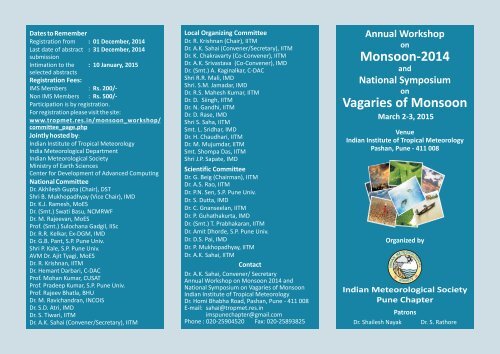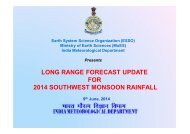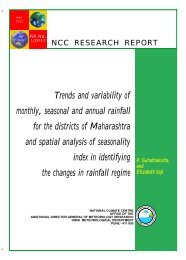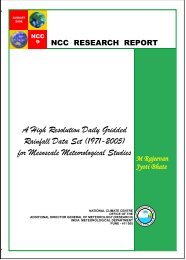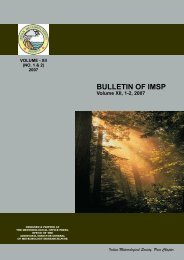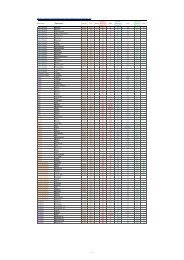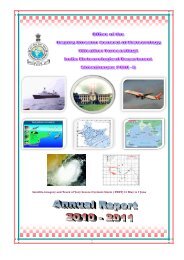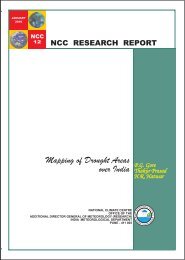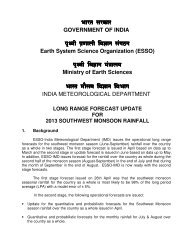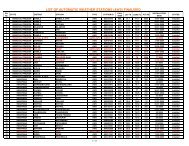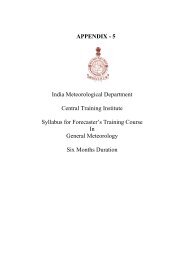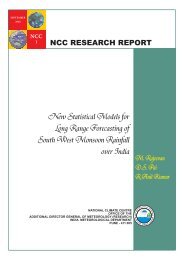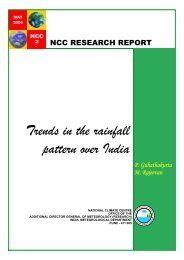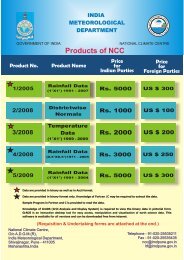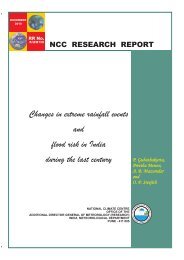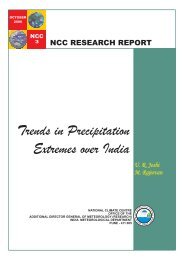forthcoming Events - (IMD), Pune
forthcoming Events - (IMD), Pune
forthcoming Events - (IMD), Pune
- No tags were found...
Create successful ePaper yourself
Turn your PDF publications into a flip-book with our unique Google optimized e-Paper software.
Dates to RememberRegistration from : 01 December, 2014Last date of abstract : 31 December, 2014submissionIntimation to the : 10 January, 2015selected abstractsRegistration Fees:IMS Members : Rs. 200/-Non IMS Members : Rs. 500/-Participation is by registration.For registration please visit the site:www.tropmet.res.in/monsoon_workshop/committee_page.phpJointly hosted by:Indian Institute of Tropical MeteorologyIndia Meteorological DepartmentIndian Meteorological SocietyMinistry of Earth SciencesCenter for Development of Advanced ComputingNational CommitteeDr. Akhilesh Gupta (Chair), DSTShri B. Mukhopadhyay (Vice Chair), <strong>IMD</strong>Dr. K.J. Ramesh, MoESDr. (Smt.) Swati Basu, NCMRWFDr. M. Rajeevan, MoESProf. (Smt.) Sulochana Gadgil, IIScDr. R.R. Kelkar, Ex-DGM, <strong>IMD</strong>Dr. G.B. Pant, S.P. <strong>Pune</strong> Univ.Shri P. Kale, S.P. <strong>Pune</strong> Univ.AVM Dr. Ajit Tyagi, MoESDr. R. Krishnan, IITMDr. Hemant Darbari, C-DACProf. Mohan Kumar, CUSATProf. Pradeep Kumar, S.P. <strong>Pune</strong> Univ.Prof. Rajeev Bhatla, BHUDr. M. Ravichandran, INCOISDr. S.D. Atri, <strong>IMD</strong>Dr. S. Tiwari, IITMDr. A.K. Sahai (Convener/Secretary), IITMLocal Organizing CommitteeDr. R. Krishnan (Chair), IITMDr. A.K. Sahai (Convener/Secretary), IITMDr. K. Chakravarty (Co-Convener), IITMDr. A.K. Srivastava (Co-Convener), <strong>IMD</strong>Dr. (Smt.) A. Kaginalkar, C-DACShri R.R. Mali, <strong>IMD</strong>Shri. S.M. Jamadar, <strong>IMD</strong>Dr. R.S. Mahesh Kumar, IITMDr. D. Siingh, IITMDr. N. Gandhi, IITMDr. D. Rase, <strong>IMD</strong>Shri S. Saha, IITMSmt. L. Sridhar, <strong>IMD</strong>Dr. H. Chaudhari, IITMDr. M. Mujumdar, IITMSmt. Shompa Das, IITMShri J.P. Sapate, <strong>IMD</strong>Scientific CommitteeDr. G. Beig (Chairman), IITMDr. A.S. Rao, IITMDr. P.N. Sen, S.P. <strong>Pune</strong> Univ.Dr. S. Dutta, <strong>IMD</strong>Dr. C. Gnanseelan, IITMDr. P. Guhathakurta, <strong>IMD</strong>Dr. (Smt.) T. Prabhakaran, IITMDr. Amit Dhorde, S.P. <strong>Pune</strong> Univ.Dr. D.S. Pai, <strong>IMD</strong>Dr. P. Mukhopadhyay, IITMDr. A.K. Sahai, IITMContactDr. A.K. Sahai, Convener/ SecretaryAnnual Workshop on Monsoon 2014 andNational Symposium on Vagaries of MonsoonIndian Institute of Tropical MeteorologyDr. Homi Bhabha Road, Pashan, <strong>Pune</strong> - 411 008E-mail: sahai@tropmet.res.inimspunechapter@gmail.comPhone : 020-25904520 Fax: 020-25893825Annual WorkshoponMonsoon-2014andNational SymposiumonVagaries of MonsoonMarch 2-3, 2015VenueIndian Institute of Tropical MeteorologyPashan, <strong>Pune</strong> - 411 008Organized byIndian Meteorological Society<strong>Pune</strong> ChapterDr. Shailesh NayakPatronsDr. S. Rathore
About IMSPThe Indian Meteorological Society, <strong>Pune</strong> Chapter(IMSP), a chapter under Indian MeteorologicalSociety, is one of the largest and active chapters inthe country. About 600 members are activelyassociated with India Meteorological Department(<strong>IMD</strong>), Indian Institute of Tropical Meteorology(IITM), various departments of University of <strong>Pune</strong>and other institutions. Even after retirement, theIMSP is the most important platform for themeteorological stalwarts to forward theirexperience and science to the young ones.In order to keep a pace with time-to-timedevelopments in the field of Meteorology, theChapter organizes a sizable number of popularlectures by eminent meteorologists from India andabroad and more thematic programs focusing onpopularization of Meteorology among the generalpublic and basic academic institutions like schoolsand colleges etc.As regular activity IMSP conducts one day“MONSOON WORKSHOP” every year. Thebehaviour and peculiarity of the monsoon seasonis discussed thoroughly during the workshop. Theworkshop also provides meteorologists working inthe operational service and research anopportunity to present various features of themonsoon in their varied point of view. In additionthe weather scientists share their views andknowledge on the changing trends in the monsoonactivity and its implications on the various issuesrelated to the climate change.Annual WorkshopThe all India seasonal mean rainfall during 2014SW monsoon season happened to be belownormal (12% deficient). Monthly rainfall over thecountry as a whole was 57% in June, 90% in Julyand August, and 108% in September with respectto their long period average. The seasonaldeficiency was mainly contributed by the largescale rainfall deficiencies over most parts of thecountry during June which in-turn resulted fromthe delayed progress of the monsoon over theseregions. What caused the delayed progress, revivaland delayed withdrawal of monsoon, what werethe observed features globally and regionally,what were the forecasts for the season and duringthe season on different temporal and spatialscales, how the forecasts helped in planning theagricultural and hydrological operations etc. willbe discussed in the annual workshop throughinvited lectures by leading experts from thecountry.Invited Talks ona) Observed features during monsoon 2014b) Long-range, extended-range, mediumrange and short-range forecasts and theirvalidationc) Agricultural and hydrological aspectsNational symposiumIndian Summer Monsoon is well known for itsrange of variability it displays to the people of thissubcontinent. The variability in rainfall exists overa wide range of time scale for days to decades andover a range of spatial scales. The Mumbaiflooding, the Uttarakhand extreme event, J&Kfloods, the erratic flooding of Brahmaputra, Gangaare a few examples of this variability of monsoon.The other side of the coin is the large scaledroughts and prolonged dry spells experiencedduring the last decade. Understanding andpredicting such events is a tough challenge to theresearchers working in this area. The workshop isaimed to bring together and share the state-of-artdevelopments in this field by the researchersworking towards understanding the monsoonvariability in multiple scales.Call for contributionsWe encourage student/research scholars (within35 years) to contribute their original research workon the following topics:a) Monsoon Variabilityb) Monsoon simulation and predictionc) Monsoon in a changing climateA soft copy of the abstract indicating the theme notexceeding 500 words may be uploaded at:www.tropmet.res.in/monsoon_workshop/committee_page.phpThere is limited fund for accommodation andrdtravel support up to 3 A/C train fare for thestudents/research scholars with first authorpaper.<strong>Pune</strong> City<strong>Pune</strong> existed as a town since 847AD and it wasearlier known as 'Queen of Deccan'. The name<strong>Pune</strong> is derived from 'Punyanagari' ({ÉÖhªÉxÉMÉ®úÒ) (Citythof Virtue), by the 13 century it had come to beknown as 'Punawadi' ({ÉÖxÉ´Éb÷Ò).The name 'Poona'was probably changed to '<strong>Pune</strong>' in 1977.<strong>Pune</strong> is located 560m (1840 ft) above the sea levelon the western margin of the Deccan plateau. It issituated on the leeward side of the Sahyadrimountain range, which forms a barrier from theArabian Sea.th<strong>Pune</strong> the 8 largest metropolises in India, and isconsidered an important city in terms of itseconomical and industrial importance. <strong>Pune</strong> alsohas made its mark as the educational epicenter ofthe country, winning itself the sobriquet, 'TheOxford of the East'. This beautiful city has manyexotic locales attracting innumerable tourists.<strong>Pune</strong> is well connected by air, rail and road.


